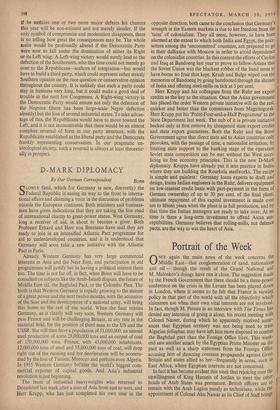D-MARK DIPLOMACY
By Our German Correspondent Bonn SLOWLY (and, which for Germany is new, discreetly) the Federal Republic is easing its way to the front in interna- tional affairs and claiming a voice in the discussion of problems outside the European continent.• Both ministers and business- men have given indications that they are taking the low road of international charity to great-power status. West Germany, long a receiver of aid, is about to become a giver. Both Professer Erhard and Herr von Brentano have said they are ready to join in an intensified Atlantic Pact programme for aid to underdeveloped countries, and it is understood that Germany will soon take a new initiative with the Atlantic Pact in Paris.
Already Western Germany has very large commercial interests in Asia and the Near East, and participation in aid programmes will justify her in having a political interest there too. The time is not far off, in fact, when Bonn will have to be consulted on subjects like the Arab-Israeli dispute, the future of Middle East oil, the Baghdad Pact, or the Colombo Plan. The truth is that Western Germany is rapidly growing to the stature of a great power and the next twelve months, with the accession of the Saar and the development of a national army, will bring this home to the rest of the world. When the Saar rejoins Germany, as it clearly will very soon, Western Germany will paSs France and will be challenging Britain, at any rate in the material field, for the position of third man to the US and the USSR. She will then have a population of 51,000,000, an annual steel production of some 28,000,000 tons and an output of coal of 150,000,000 tons. France, with 43,000,000 inhabitants, 12,000,000 tons of steel and 55,000,000 tons of coal, will drop right out of the running and her deceleration will be accentu- ated by the loss of Tunisia, Morocco and perhaps even Algeria. In 1955 Western Germany became the world's biggest com- mercial exporter of capital goods. And Asia's industrial revolution is just beginning.
The team of industrial heavyweights who returned to Dtisseldorf last week after a tour of Asia from east to west, and Herr Krupp, who has just completed his own tour in the opposite direction, both came to the conclusion that Germany's strength in the Eastern markets is due to her freedom from the `taint' of colonialism. They all seem, however, to have been alarmed at the extent to which both India and Egypt, the pace- setters among the 'uncommitted' countries, are prepared to go in their dalliance with Moscow in order to avoid dependence on the colonialist countries. In this context the efforts of Ceylon and Iraq at Bandoeng last year to prove to fellow-Asians that the Soviet Union was the blackest robber of the band seem to have borne no fruit that kept. Krush and Bulge wiped out the memories of Bandoeng by going barefooted through the shrines of India and offering steel-mills on tick at 3 per cent.
Herr Krupp and his colleagues from the Ruhr see export credits as the key to the situation. Once the Asian government has placed the order Western private initiative will do the rest, quicker and better than the commissars from Magnitogorsk. Herr Krupp put his `Point-Four-and-a-Half Programme' to the State Department last week. The nub of it is private initiative backed only at first remove by cheapened state export credits and state export guarantees. Both the Ruhr and the Bonn Government agree that direct state aid to Asian countries only provokes, with the passage of time, a nationalist irritation; by limiting state support to the banking stage of the operation Soviet state competition can be met without the West sacri- ficing its free economy principles. This is the new D-Mark diplomacy. Krupps have already put it into practice in India, where they are building the Rourkela steelworks. The recipe is simple and painless: Germany loans experts to draft and design, trains Indian engineers in the Ruhr, delivers equipment on low-interest credit basis with part-payment in the form of German ownership of up to 30 per cent. of the final plant; ultimate repayment of this capital investment is made over ten to fifteen years when the plant is in full production, and by that time the Indian managers are ready to take over. At ne time is there a long-term investment to offend Asian sus- ceptibilities. Germany believes that rolling-mills, not defence pacts, are the way to win the heart of Asia.


































 Previous page
Previous page